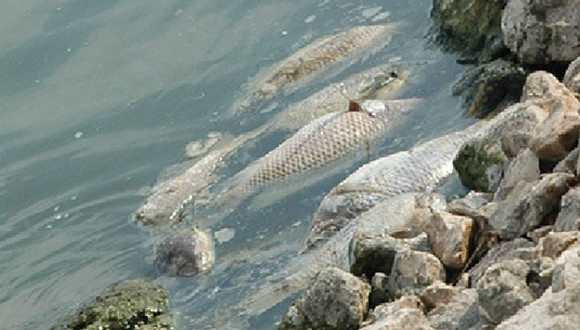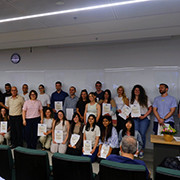Finding a Needle in a Lake: The Tel Aviv University Scientist Leading the Struggle Against Marine Epidemics
The latest discovery follows a previous discovery by Bacharach and his colleagues of a virus attacking tilapia populations worldwide.
Prof. Eran Bacharach did not plan to become an expert in fish diseases. "My main interest is viruses affecting mammals, and especially humans. I never planned to become associated with fish," he says. However, after discovering two separate viruses responsible for diseases in two different fish species, both crucial to the global food industry, Bacharach grudgingly acknowledges his title as an expert in marine viruses.
He and his colleagues have recently discovered a virus in a population of farmed rainbow trout, which is a distant relative of the COVID-19 virus. "This virus damages the fish's liver and causes other symptoms," he describes. Although the virus is completely harmless to humans, rainbow trout, scientifically known as Oncorhynchus mykiss, is a main inland-farmed fish in the western hemisphere, and the discovery could be significant in protecting a valuable food source. The discovery was described in a paper published in the scientific journal iScience a few months ago.
"One challenge in identifying fish diseases is that a fish doesn't go to the doctor and tell her it doesn't feel well. We can see signs of a viral disease, but if the virus doesn't appear in any database and its sequence is not similar to any known virus, we need to rely on advanced molecular methods to identify the cause of the disease."
Food Security Threat
The latest discovery follows a previous discovery by Bacharach and his colleagues of a virus attacking tilapia populations worldwide. Since its discovery in 2014, cases of the viral disease in fish have been reported in different continents and countries, such as Colombia, Egypt, and Thailand. The UN Food and Agriculture Organization and the World Organization for Animal Health have categorized it as an emerging pathogen, causing a global epidemic, endangering the entire tilapia industry, and threatening food security in many countries relying on tilapia as a major protein source.
The journey to discover the virus started about a decade ago when one of Bacharach's friends from his graduate studies, Dr. Avi Eldar from the Kimron Veterinary Institute (KVI) of the Israeli Agriculture Ministry, asked his help in identifying the mysterious pathogen killing tilapia fish in the Sea of Galilee and Israeli fish farms, and told him that different international reference labs failed to determine the cause of the disease. Following the discovery of the pathogen as a virus, now called the tilapia lake virus (TiLV), in collaboration with Prof. Ian Lipkin of Columbia University, Bacharach and his colleagues have made significant progress. They succeeded in advancing towards developing a possible vaccine against the virus. "The vaccine-related technologies were licensed to two companies, which are now working on bringing it to market," he adds.
Long-distance Virus Relatives
"TiLV is a fascinating virus because its genome bears almost no homology to other known viruses. However, my lab manager, Dr. Rachel Zamostiano, and two former Ph.D. students in my lab, Japhette Esther Kembou-Ringert and Reem Abu Rass, together with my two colleagues from Tel Aviv University - Prof. Adi Stern and Prof. Marcelo Ehrlich, showed that TiLV is a long-distance family member of the flu virus", says Bacharach.
The new trout virus is even more challenging to study than the tilapia virus. "We were able to identify the sequence of the virus from fish samples, but still couldn't isolate and grow the virus itself". The obstacle didn't stop Bacharach and his collaborators, Drs. Sharon Karniely and Avi Eldar of the KVI from developing a PCR test, similar to the one used to diagnose the COVID-19 virus in humans. "We recently sent relevant reagents to a collaborator abroad who suspects the virus is affecting trout populations there", says Bacharach. In addition, analyzing the viral genome enabled the researchers to identify possible targets for vaccination studies. "With this knowledge, we can now develop a possible vaccine against the newly discovered virus and new tools to assess vaccine efficacy even without isolating the virus itself," promises Bacharach.





